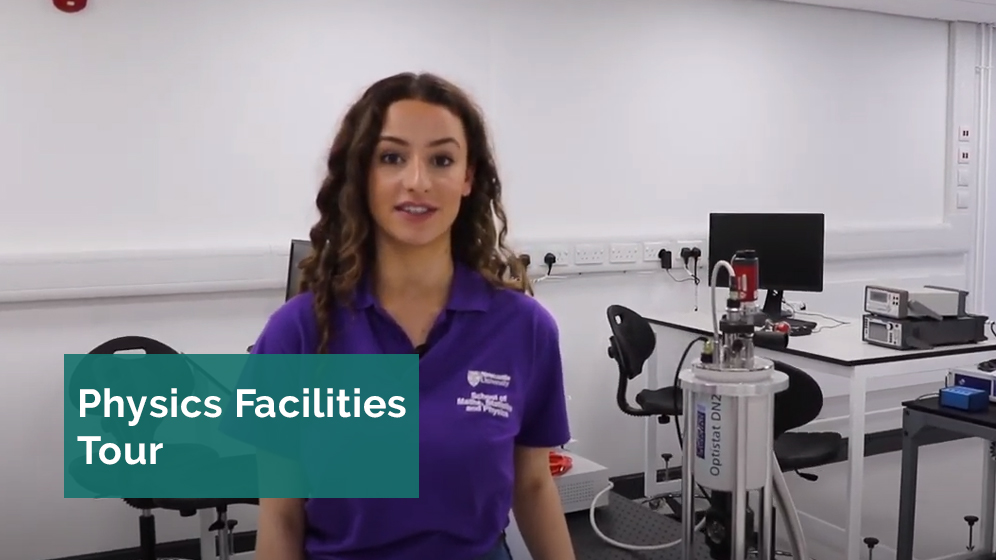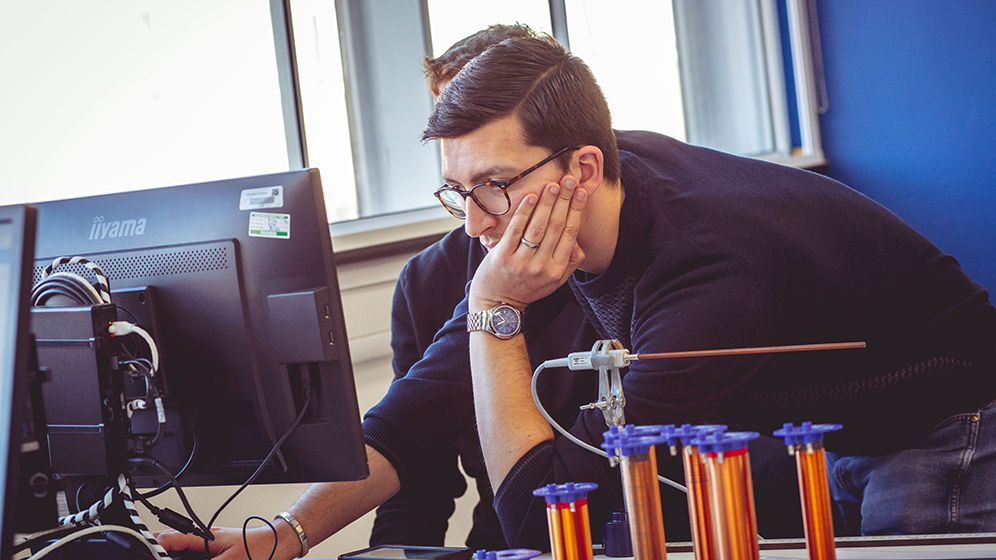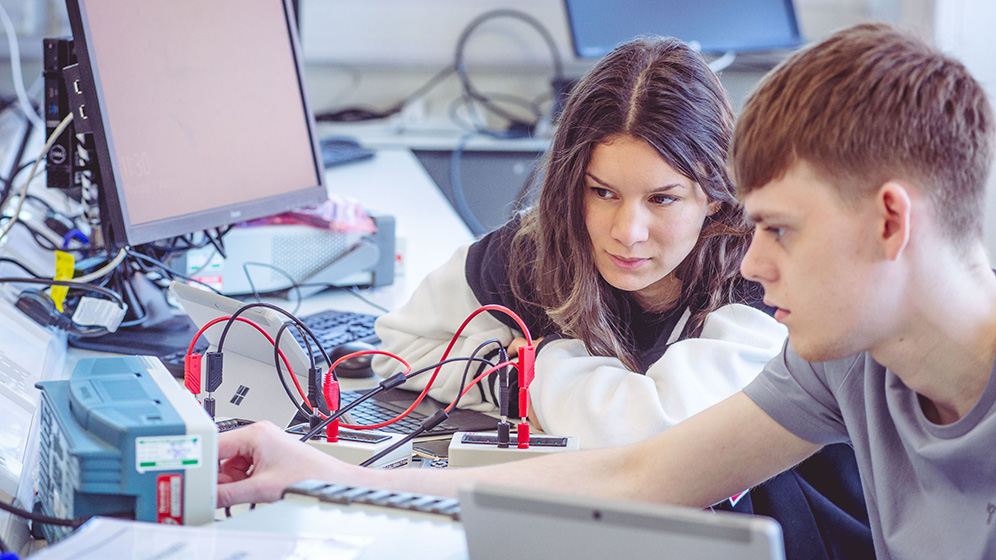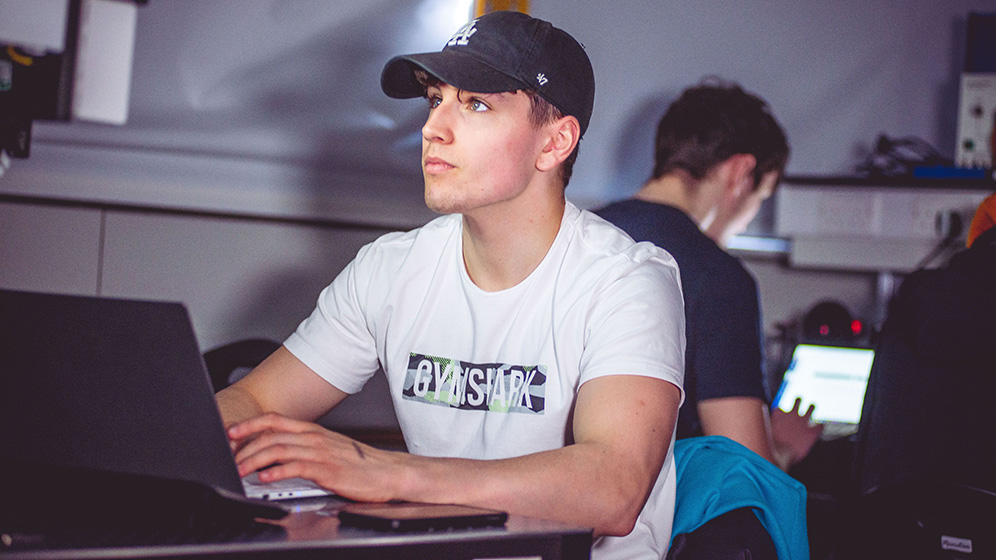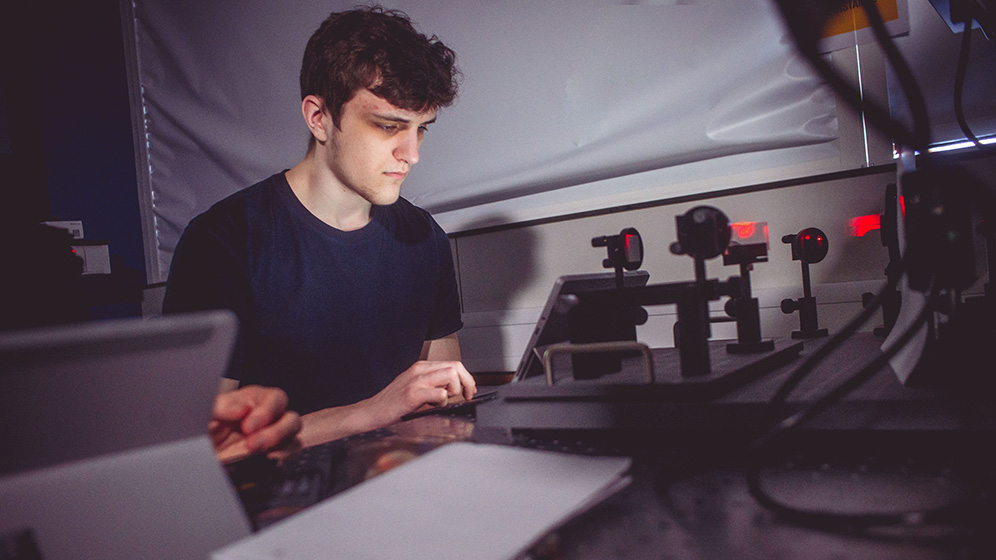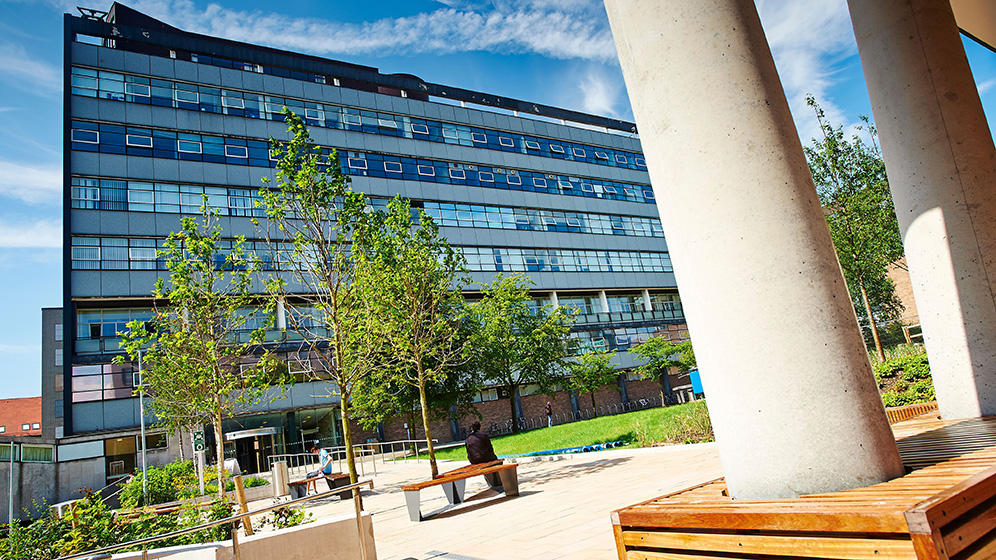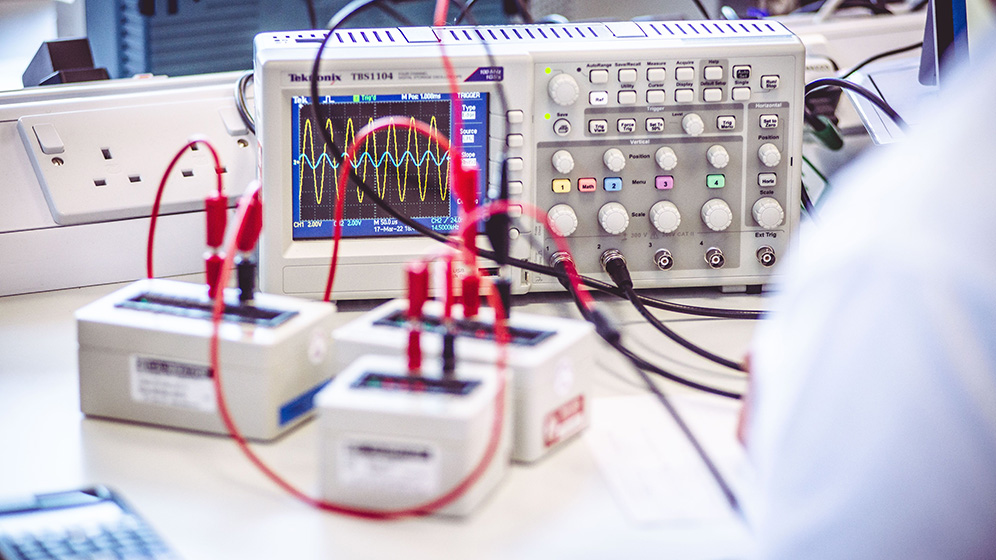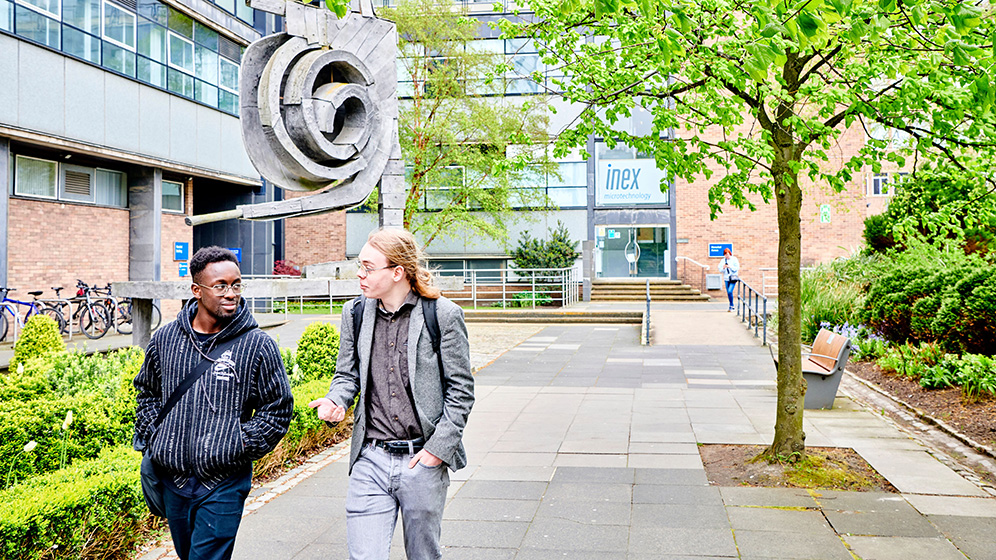Physics with Astrophysics BSc Honours
- UCAS code: F3F5
- Full time
- 3 years
Explore the mysteries of the universe with our Physics with Astrophysics BSc degree.
You are currently viewing course information for entry year: 2026
Next start date:
- September 2026
UCAS Institution name and code:
- NEWC / N21
Course overview
Apply physics, mathematics, and computation to understand the origin and evolution of the universe.
During your three-year Physics with Astrophysics BSc, you'll specialise in astrophysics and study:
- advanced astronomy
- stellar structure and evolution
- cosmology
- high-energy astrophysics and black holes
These modules are unique to our Physics with Astrophysics degrees. But you’ll also study a set of physics modules which are common across our Physics BSc courses.
You’ll gain hands-on experience in our high-spec facilities, developing your practical skills.
By the end of your degree, you’ll have a strong understanding of physics and advanced mathematics. You'll be prepared for a range of careers in research, industry, and beyond.
Flexible degree structure
Our flexible degree structure allows you to tailor your studies. All students follow the same curriculum in Stage 1, and begin to specialise in Stage 2. You can transfer between Physics disciplines until the end of Stage 1. You can also switch between the BSc and MPhys of your chosen discipline until the end of Stage 2:
- Physics BSc
- Theoretical Physics BSc
- Physics with Astrophysics BSc
You'll graduate with an accredited degree and an interdisciplinary skillset in-demand with employers. This course is also ideal for someone interested in pursuing research or further study in physics or mathematics.
BSc or MPhys?
Physics with Astrophysics is offered at two levels:
- three-year Bachelor of Science (BSc)
- four-year Master of Physics (MPhys)
Our MPhys degree has an extra year of advanced study at Master's level. You’ll study more advanced topics and work on an extended project. You’ll learn about research methodology and work with experts in their field.
READ MORE
Sorry, you need JavaScript to view this video
Your course and study experience - disclaimers and terms and conditions
Please rest assured we make all reasonable efforts to provide you with the programmes, services and facilities described. However, it may be necessary to make changes due to significant disruption, for example in response to Covid-19.
View our Academic experience page, which gives information about your Newcastle University study experience for the academic year 2025-26.
See our terms and conditions and student complaints information, which gives details of circumstances that may lead to changes to programmes, modules or University services.
Quality and ranking
Professional accreditation and recognition
All professional accreditations are reviewed regularly by their professional body.
Modules and learning
Modules
The information below is intended to provide an example of what you will study.
Most degrees are divided into stages. Each stage lasts for one academic year, and you'll complete modules totalling 120 credits by the end of each stage.
Our teaching is informed by research. Course content may change periodically to reflect developments in the discipline, the requirements of external bodies and partners, and student feedback.
Featured module
PHY2029: Introduction to Astronomy Data and Analysis MethodsExplore data analysis through real astrophysical case studies. Learn to handle complex datasets and uncover insights - skills our graduates value highly for careers in computation, data science, and beyond.
.jpg)
Optional module availability
Student demand for optional modules may affect availability.
Full details of the modules on offer will be published through the Programme Regulations and Specifications ahead of each academic year. This usually happens in May.
To find out more please see our terms and conditions
During Stage 1, you’ll study introductory modules in physics and mathematics. You’ll also spend time in the lab working on experiments.
Modules
| Compulsory Modules | Credits |
|---|---|
| Introductory Algebra | 10 |
| Introductory Calculus and Differential Equations | 20 |
| Multivariable Calculus | 10 |
| Dynamics | 10 |
| Introductory Astrophysics | 10 |
| Introductory Electromagnetism | 10 |
| Introductory Quantum Mechanics | 10 |
| Laboratory Physics 1 | 20 |
| States of Matter, Waves & AC Theory | 20 |
You'll continue learning about the core concepts of physics, including quantum mechanics and electromagnetism. You’ll also study modules in fluid dynamics, data analysis, and computational methods for theoretical physics.
Modules
During Stage 3, you’ll study a range of advanced modules and work on two different projects.
You'll choose one optional module.
Modules
| Compulsory Modules | Credits |
|---|---|
| Advanced Quantum Mechanics | 10 |
| Relativity and Fundamental Particles | 10 |
| Advanced Materials and Solid-State Physics | 10 |
| Atoms, Molecules, and Nuclei | 10 |
| Team Project | 10 |
| Individual Project | 20 |
| Advanced Astronomy | 10 |
| Stellar Structure and Evolution | 10 |
| Cosmology | 10 |
| High Energy Astrophysics and Black Holes | 10 |
| Optional Modules | Credits |
|---|---|
| Mathematical Biology | 10 |
| Variational Methods and Lagrangian Dynamics | 10 |
| Classical Fields | 10 |
We base these figures and graphs on the most up-to-date information available to us. They are based on the modules chosen by our students in 2024-25.
Teaching time is made up of:
- scheduled learning and teaching activities. These are timetabled activities with a member of staff present.
- structured guided learning. These are activities developed by staff to support engagement with module learning. Students or groups of students undertake these activities without direct staff participation or supervision
Teaching and assessment
Teaching methods
You'll be taught via a range of approaches, including:
- lectures and seminars
- small group tutorials
- problem classes
- laboratory sessions
- practical computing sessions
- practical sessions with telescopes
In Stage 1, you’ll work on experiments and projects in our labs. These practical sessions will be about 45 hours in total.
Assessment methods
You'll be assessed through a combination of:
-
Assessments
-
Examinations – practical or online
-
Group work
-
Projects
-
Reports
Skills and experience
Practical experience
This degree will give you practical skills that can be applied across a wide range of industries. You'll develop highly valued attributes, such as:
- problem-solving
- time management
- resilience
- the ability to meet deadlines
Using our high-spec facilities, and working alongside our expert staff, you'll:
- gain experimental experience in our state-of-the-art laboratories
- work on lab and project-based modules, based on real-world challenges
- develop analytical and computational skills, using industry-relevant software
- enhance your written and oral communication skills
- learn from experts in the field at a leading Russell Group university
Business skills
Physics graduates are highly valued for their transferable skills. You'll graduate with strong abilities, including:
- problem-solving
- a logical, analytical mindset
- big data analysis
- communication
- teamwork
Research skills
In your final year you'll complete an individual project. You'll have the opportunity to perform independent investigations into a topic of interest.
We have an interdisciplinary approach to research. Our academic staff are experts in their field, with a diverse range of research strengths.
We have research expertise in:
- galaxy formation and evolution
- black holes and accretion physics
- stellar structure and asteroseismology
- observational and theoretical cosmology
- magnetohydrodynamics and planetary interiors
- high-performance computational astrophysics
Research areas in the School of Mathematics, Statistics and Physics
Student Stories
Adam, Theoretical Physics graduate, shares the highlights of his course, why he chose Newcastle, and advice for new students.
Opportunities
Study abroad year
Experience life in another country by choosing to study abroad as part of your degree. You’ll be encouraged to embrace fun and challenging experiences, make connections with new communities and graduate as a globally aware professional, ready for your future.
You can choose to spend up to a year studying at a partner institution overseas. Our overseas partner institutions include:
- Universiteit Leiden, Netherlands
- L-Universta ta' Malta, Malta
- Universitat Politècnica de Catalunya, Barcelona
- Technisches Universitat Munchen, Munich
There are also lots of options in North America, Australia and Asia, including:
- Buffalo, New York State
- McGill, Montreal
- University of New South Wales, Sydney
- Hong Kong
- Singapore
During your time studying abroad, you will select from a range of modules offered by your host university. Alongside taking some subject-relevant modules, you will be given greater flexibility to choose modules from different disciplines (eg Languages, Business)
If you choose to study abroad, it will extend your degree by a year.
Short-term global opportunities
During your degree, you can take part in short-term global opportunities in countries such as:
- USA
- Cyprus
- Hong Kong
- Singapore
- Sri Lanka
The activities range from four days to eight+ weeks, and include:
- summer schools
- internships
- volunteering
- experiential learning
Funding is available to support students who want to participate.
Work placement
Apply your practical skills, increase your confidence and gain real-life work experience to accelerate your career. Take a 9-12-month industrial placement in the UK or abroad. Work placements usually take place in stage 3 of your studies and extend your degree by one year.
Facilities and environment
Facilities
As a physics student at Newcastle University, you'll be based at our city-centre campus in the School of Mathematics, Statistics and Physics' Herschel Building.
The School has high-specification laboratory facilities equipped with leading experimental and computational physics capabilities, such as:
- cryogenics labs
- semiconductor labs
- High-Performance Computing
- data from the Large Synoptic Survey Telescope
The Herschel Building also has dedicated study and social spaces, and a computing area.
Support
We take your health and wellbeing seriously and are committed to supporting you throughout your studies so you can fulfil your potential at university. This support includes:
- a personal tutor who is an academic member of staff who can help you with academic and personal issues throughout your degree
- a peer mentor scheme which pairs you with a current student from your course to help you navigate your first year at university
- a staff-student committee, to give you an opportunity to have a say in how your degree works
- Student Wellbeing Advisors who can offer comprehensive listening and support and signpost you to other University support services or external support agencies
Transition Officer
A dedicated staff member is here to support you in transitioning from school to university study.
The Transition Officer works with Stage 1 undergraduates to provide:
- Stage 1 pastoral and academic support
- attendance and academic performance monitoring
- Stage 1 induction
- weekly drop-ins
You'll also benefit from our:
- induction programme, including social events, to help you settle in quickly
- activities and events run by our student-run society, PhysSoc
- peer supported academic drop-in sessions to help with assignments
Your future
Graduating with a degree in physics
Our graduates have gone on to work as:
- power systems engineers
- research software engineers
- programmers
- tax associates
- consultants
Employability is embedded throughout your degree, with opportunities to connect with alumni and employers each year. All physics students are invited to attend the annual WRIPA Physics Careers Fair, a major event that brings together employers actively seeking physics graduates.
Our graduates are well-prepared for careers in research and academia, but many also move into fast-growing and diverse sectors in the North East and beyond, including:
- advanced materials and semiconductors
- defence
- energy transition, infrastructure and electrification
- fibre-optics and communications
- space, satellite technology, and earth observation
In addition, physics graduates are highly valued in a range of other fields such as:
- accounting
- banking and financial services
- data analytics
- energy: nuclear and offshore
- engineering: consulting and manufacturing
- IT and software development
- management consultancy
- NHS medical physics
- teaching
- telecommunications
- traffic and transport management
- utilities, including the water sector
Many of our students also go on to further study, including teacher training or PhD programmes in physics and related disciplines.
Our links with industry
The Department of Physics has extensive research and alumni links with leading companies and external organisations. These connections help inform our teaching and support student networking and career development opportunities.
Our industry links include:
- BBC
- Cosm (Digistar)
- De Beers
- Engineering and Physical Sciences Research Council (EPSRC)
- European Southern Observatory (ESO)
- European Space Agency (EUCLID Space Observatory)
- FreeAgent
- Intel
- Johnson Matthey
- Jumping Rivers
- James Webb Space Telescope (JWST)
- Met Office
- Mind Foundry
- National Audit Office
- National Space Centre
- NICD
- Northern Gas Networks
- Oliver Wyman
- Phase Photonics
- Science and Technology Facilities Council (STFC)
- Vera C. Rubin Observatory (LSST)
Make a difference
Sorry, you need JavaScript to view this video
Careers support
Our Careers Service is one of the largest and best in the country, and we have strong links with employers. We provide an extensive range of opportunities to all students through our ncl+ initiative.
Visit our Careers Service website
Recognition of professional qualifications outside of the UK
If you’re studying an accredited degree and thinking about working in Europe after you graduate, the best place to find current information is the UK Government’s guidance on recognition of UK professional qualifications in EU member states. This official resource explains whether your profession is regulated in another country, what steps you need to take, and which organisation you should contact.
Entry requirements
All candidates are considered on an individual basis and we accept a broad range of qualifications.
The entrance requirements and offers below apply to 2026 entry.
| A-Level | |
|---|---|
| International Baccalaureate | |
|---|---|
Other UK and the Republic of Ireland qualifications
Alternative offers at Newcastle
Through one of our contextual or alternative offer routes, you could receive an offer of up to three grades lower than the typical requirements.
Contextual offers
We use certain contextual data from your UCAS form, alongside your application, to consider challenges that you may have faced in your education and the potential effect this may have had on your qualifications. This means you may be eligible to receive a lower contextual offer.
PARTNERS offers
One of the largest and longest support entry routes to university of its kind for students from underrepresented backgrounds. We support applicants from application through to study.
Realising Opportunities offers
A unique programme delivered in collaboration with 10 leading, research-intensive universities in the UK. The programme is open to students in Year 12/first year of college.
Pathways to Newcastle offers
Pathways to Newcastle, our national skills entry route, is available for specific subject areas.
High Performance Athletes
We support promising athletes at the application stage, who compete in regional, national or international levels in their sport.
Qualifications from outside the UK
English Language requirements
Entrance courses (INTO)
International Pathway courses are specialist programmes designed for international students who want to study in the UK. We provide a range of study options for international students in partnership with INTO.
These courses are specifically designed for international students who want to study in the UK and progress onto one of our undergraduate degrees. Our International Study Centre, has a range of study options including:
- International Foundation
- International Year One
- English Language courses
Find out more about International Pathway courses
Admissions policy
This policy applies to all undergraduate and postgraduate admissions at Newcastle University. It is intended to provide information about our admissions policies and procedures to applicants and potential applicants, to their advisors and family members, and to staff of the University.
University Admissions Policy and related policies and procedures
Credit transfer and Recognition of Prior Learning
Recognition of Prior Learning (RPL) can allow you to convert existing relevant university-level knowledge, skills and experience into credits towards a qualification. Find out more about the RPL policy which may apply to this course.
Additional information
Advice on maths and physics requirements
If you don’t think you will have the exact mathematics and science qualifications referred to in our entry requirements by the time you need them, you may not be sure what to do.
- If you have A-Level qualifications (or equivalent) but not in Maths and/or Physics, you should apply for Physics with Foundation Year. This course gives access to all of our Physics, Astrophysics and Theoretical Physics programmes.
- If you have A-levels (or equivalent) but don't meet the required grade(s) in Maths and Physics, contact us for advice. We may decide to consider you for Foundation Year entry, or it may be that this course is not the best option for you.
- If you have relevant qualifications but not at A-level (or equivalent) standard, you should apply for either Stage 1 or the Foundation Year. The Admissions Tutor will assess your application and offer you the most suitable course. Your offer may include a requirement to complete pre-entry Maths and/or Physics courses and examinations. It may also involve an admissions interview.
- If it has been some time since you completed your qualifications, you should apply for either Stage 1 or the Foundation Year. The Admissions Tutor will assess your application and offer you the most suitable course. Your offer may include a requirement to complete pre-entry Maths and/or Physics courses and examinations. It may also involve an admissions interview.
If you are still not sure, don’t worry. Whatever you apply for, our Admissions Tutors will help you decide which is the best route for you. They may, therefore, make you an offer for a different course from the one you apply for (eg Foundation Year entry instead of Year 1 entry).
Tuition fees and scholarships
Tuition fees for academic year 2026-2027
The 2026 entry home fees have not yet been confirmed.
| Qualification: BSc Honours | |
|---|---|
|
Home students full time 3 years |
Tuition fees (Year 1)
Not set |
|
International students full time 3 years |
Tuition fees (Year 1)
31,500 |
Year abroad and additional costs
For programmes where you can spend a year on a work placement or studying abroad, you will receive a significant fee reduction for that year.
Some of our degrees involve additional costs which are not covered by your tuition fees.
Scholarships
Find out more about:
Open days and events
You'll have a number of opportunities to meet us throughout the year at our on-campus and virtual open days.
You'll be able to:
- explore our beautiful campus
- find out about our vibrant city
- discover what students think about studying at Newcastle
You'll also have the opportunity to speak to academic staff and find out more about the subjects you're interested in.
Find out about how you can visit Newcastle in person and virtually.
We regularly travel overseas to meet with students interested in studying at Newcastle University. Visit our events calendar to find out when we're visiting your region.
How to apply
Apply through UCAS
To apply for undergraduate study at Newcastle University, you must use the online application system managed by the Universities and Colleges Admissions Service (UCAS). All UK schools and colleges, and a small number of EU and international establishments, are registered with UCAS. You will need:
- the UCAS name and institution codes for Newcastle University (NEWC/N21)
- the UCAS code for the course you want to apply for
- the UCAS 'buzzword' for your school or college
If you are applying independently, or are applying from a school or college which is not registered to manage applications, you will still use the Apply system. You will not need a buzzword.
Apply through UCASApply through an agent
International students often apply to us through an agent. Have a look at our recommended agents and get in touch with them.
Get in touch
By phone
Call us on +44 (0) 191 208 3333 and press option 1. Our opening hours are Monday to Friday 10am until 4pm.
Live chat
Our NCL chatbot might be able to give you an answer straight away. If not, it’ll direct you to someone who can help.
You'll find our NCL chatbot in the bottom right of this page.
Online
Chat to our students
Choosing a university is a big decision. If you've got questions about a particular course, student life or the city of Newcastle, why not chat to our friendly students or graduates!
Keep updated
We regularly send email updates and extra information about the University.
Receive regular updates by email



